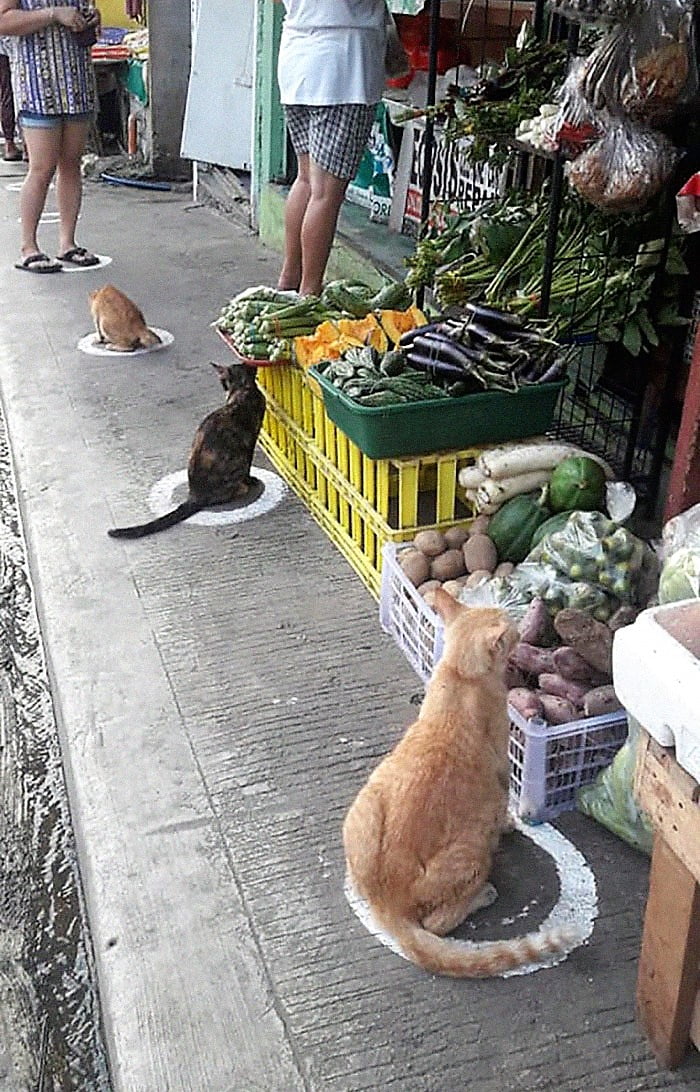What are community cats? Where do they live?
What are community cats?
Community cats are cats that live outdoors in a specific area and are cared for by a community of people, rather than living in a single household. They may also be referred to as feral cats, stray cats, or free-roaming cats. |
| Community cats of Manila, Philippines during Covid-19. Image in public domain. |
These cats are often the descendants of domestic cats that were abandoned or lost and have adapted to living in the outdoors. Some community cats may be friendly and socialized to humans, while others may be fearful and avoid contact with people. Community cats can be found in a variety of settings, including urban, suburban, and rural areas.
They play an important role in controlling rodent populations and can provide companionship for people who enjoy interacting with them. Many communities have programs in place to help manage community cat populations through trap-neuter-return (TNR) programs, which involves trapping, sterilizing, and returning cats to their original location to live out their lives.
In the United States, community cats are common and there are many organizations and programs dedicated to their care and management, such as TNR programs. Community cats can also be found in countries such as Canada, the United Kingdom, Australia, and many countries in Europe. India is well known for their community cats.
In some countries in Asia and the Middle East, community cats may not receive the same level of care and may be viewed as nuisances or even persecuted. In some cultures, cats are not considered as pets and may be treated poorly or viewed as unclean.
Overall, the treatment and care of community cats vary from country to country, and there are efforts being made to improve their welfare in many parts of the world.
Where will you see community cats?
Community cats can be found in a variety of locations, but they are most commonly found in urban and suburban areas. They may live in alleyways, abandoned buildings, parks, and other public areas. Community cats can also be found in rural areas, where they may live in barns, sheds, or other structures.
They tend to congregate in areas where there is a reliable source of food, such as near restaurants or in residential neighborhoods where people may leave food out for them. In many cases, community cats are fed and cared for by local residents who may provide food, water, and shelter for them.
It's important to note that while community cats are often seen outdoors, they can still benefit from medical care, such as spay and neuter services, to help control their population and prevent the spread of disease.
In which countries can you see community cats?
Community cats can be found in many countries around the world, but their populations and treatment can vary depending on cultural and societal norms. Some countries have a more accepting attitude towards community cats and have implemented policies to protect them, while in other countries they may be seen as pests and subject to extermination efforts.In the United States, community cats are common and there are many organizations and programs dedicated to their care and management, such as TNR programs. Community cats can also be found in countries such as Canada, the United Kingdom, Australia, and many countries in Europe. India is well known for their community cats.
In some countries in Asia and the Middle East, community cats may not receive the same level of care and may be viewed as nuisances or even persecuted. In some cultures, cats are not considered as pets and may be treated poorly or viewed as unclean.
Overall, the treatment and care of community cats vary from country to country, and there are efforts being made to improve their welfare in many parts of the world.
Weakness
A weakness in the concept of community cats is that they rarely receive proper medical attention when ill, I guess because no single person takes responsibility for an individual cat. There must exceptions to this however.




Comments
Post a Comment
I love comments. Please share. Thanks in advance.